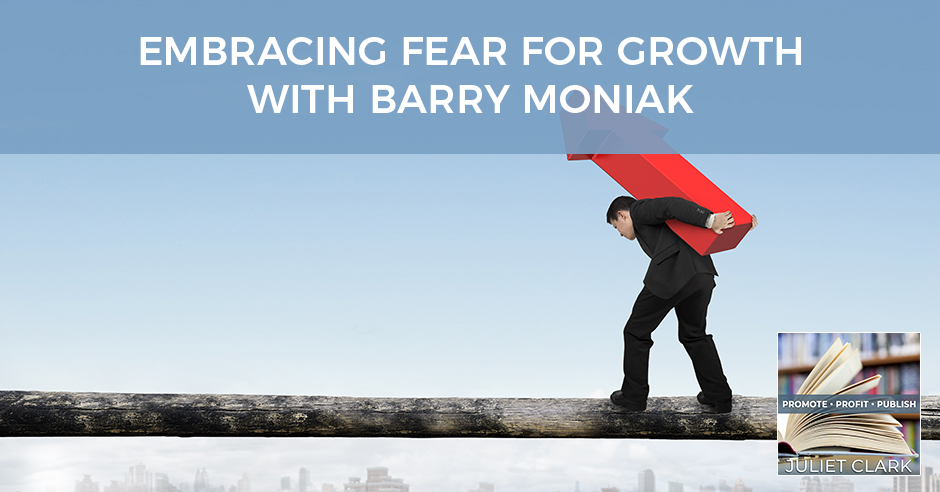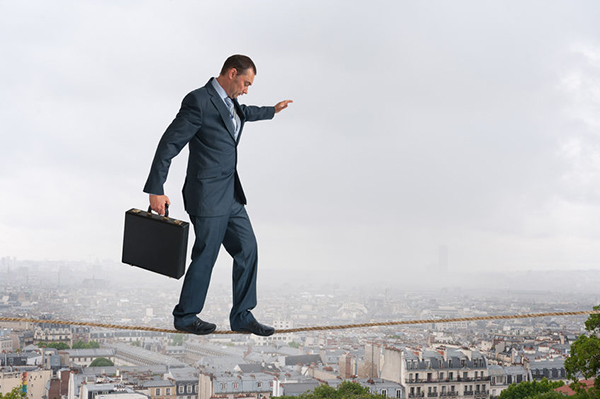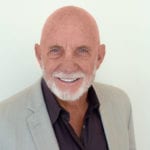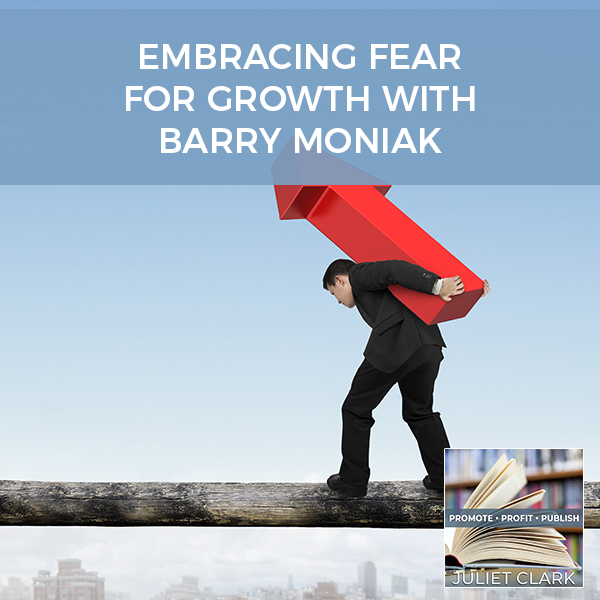
Fear is a normal feeling we all have at work and life in general. Identifying and combatting it takes proper mind shifts, and in this episode, fear expert Barry Moniak shows us how we can shift our mindset to conquer scary moments in our lives. Barry is the Founder of End In Mind, a consulting practice focused on developing more functional, personal, interpersonal, and organizational relationships with fear. As the expert in this field, he discusses the two types of fears, how we can deny it, and how it affects our awareness. From a business perspective, fear can be embraced by befriending the forces that create it and differentiating it from our subconscious reactions. He also talks a bit about how disconnecting from some people in your life can initiate your growth and success.
—
Watch the episode here
Listen to the podcast here
Embracing Fear For Growth with Barry Moniak
Our guest is Barry Moniak. He is a fear expert who gets leaders and sales professionals to deal with tough challenges the way black diamond skiers approach formidable ski slopes. A core trait which sets fearless leaders apart is a developed inclination to befriend fear, transforming it into more beneficial kind of energy. They then infuse this atypical approach to fear into those who look to them for leadership, thereby developing fearless teams. Many years ago, Barry founded End In Mind, a consulting practice focused on developing more functional, personal, interpersonal and organizational relationships with fear.
He has presented various topics dealing with fear over the last several years. His empathetic, intuitional nature adds flavor and depth of understanding to his approach. Through entertaining and interactive onstage presentations, he speaks to real issues around fear. He believes that in order to succeed in business and in life, we must treat people and organizations as integrated human beings, living entities. He assesses areas where individuals and teams experience fear. He evaluates their responses, reactions and even denials of fear and then empowers them to face, embrace and befriend those fears. Welcome, Barry.
Thank you for having me.
Why would I want to befriend my fear?
People have this idea that fear is like a demon and people almost talk to it like it’s some demonic force, “Get thee behind me fear.” Fear is energy. It’s a force of human nature. We all experience it to some degree and we all experience it differently. My fear and your fear are not going to be exactly the same. When someone is resisting the fear, what they’re resisting is the information that fear is trying to present to us. There are two types of fear. Natural fear you’re about to move in front of a fast car. You’re about to fall off a cliff where one more step and that’s it, game over. That fear is protecting us and we want to wrap our arms around it and say, “Thank you for saving my butt. If it wasn’t for you, I might have done something stupid.”
The projected fear where there may not be an imminent danger, but we’re acting as if something terrible could happen. That’s where fear is giving us the information or the feedback that we lack the adequate mindset or skillset to do what it is we’re attempting to do. Rather than freaking out, running away or denying it, if we said, “Do I need to learn something more? Do I need to develop a better skill?” then we can come back and have a very different relationship with it. That’s what I discovered in skiing. The people who were smiling and giddy all day had befriended the fear of gravity. Me and the rest of us, we were still wrestling with it going, “I don’t like this. This doesn’t feel good.” If I went back to a flat-level parking lot, there’s no more fear but there’s no more momentum. Now, I need to push something or be pulled by something in order to move.
How do we deny fear?
The top goal when studying self-improvement and spiritual awakening is awareness. Share on XThat’s something that we can thank our social societal history. We have been culturally indoctrinated that fear is a weakness. If you admit fear, now you’re a fool in addition to being weak. We don’t admit our fears in any arena. You don’t hear people talk about that. We suck it up. We deny it. We act like, “It doesn’t happen to people like me.”
How does fear affect one’s awareness?
I don’t know how long now, it’s probably been quite a while. We’ve had this saying that knowledge is power and I think that made a lot of sense for a long time. Nowadays, I believe awareness is power. Knowing about something doesn’t mean that you have the wherewithal or the expertise to use that knowledge wisely. When you study self-improvement and spiritual awakening, the goal at the top of the mountain is awareness. You want to become more aware of who we are, what’s going on around us, and fear inhibits and constricts our awareness. We go into more of a tunnel vision so things that I know or abilities that I have, I don’t have access to those things when I’m in a state of fear. When I have befriended the fear, now my awareness can open back up and I can utilize my knowledge and my skill to serve me in a more functional way.
Is that like when you’re in a situation, you freak out and then you take a few deep breaths and move through it? Is it like that?
Yeah, exactly. It’s the old, “Let’s take a time out and look at this from another perspective. Let me get back to you in a little bit and we’ll reexamine what we’re talking about.” All of a sudden, you have a different perspective. You’re talking about something that I don’t know in business. Business leaders get weird when something’s being talked about that they don’t feel like they know or understand. They will not admit that. Rather than saying, “Barry, could you explain that to me?” There are so many scenarios where we’re like, “Can you explain that to me in a way that I can understand? I’m the one who needs to make an intelligent decision here,” but we don’t do that.
Do we in those situations try to fake it until we make it?
Exactly and that’s where the more we go into denial, the less it haunts us, “I don’t know what I’m doing or I don’t know what’s going to happen next or what’s around the corner.” Ignorance is bliss.

Embracing Fear For Growth : Identifying what is going on with you is not a weakness but a strength.
I like that one. That’s one of my favorites. That’s not okay?
If we’re at the beach or hiking a wonderful mountain trail, sure. If we’re in a personal relationship dilemma or a business quandary, maybe not so much.
What’s that company where No Fear is their tagline? I can’t think of what it is, but this question reminds me. Does being fearless mean there is no fear?
That’s our idea, that if I’m fearless, I experience no fear. When you talk to people that we would think they don’t experience fear. A firefighter running into a flame, a soldier moving forward into the line of fire, a surgeon cutting somebody open where they know their life is literally in my hands. They will tell you, “Yes, there is a fear,” and they are managing that fear because they’re bringing their A-game to, “I know what I’m doing and I developed a skillset to make it so.” That’s the problem is we’re not owning what we don’t know or what we haven’t developed.
When you’re identifying fears, we talk about in business the fear of failure, the fear of success, the fear of the bathroom on a particular day or whatever that fear is. How do you identify what that fear is? Don’t some fears mask other fears? Was that a deep question?
Absolutely, fears hide behind other fears or we will project something that makes more sense to us or that we can wrap our mind around, “I don’t like you. Why don’t I like you?” Because I’m afraid you see something about me that I don’t want you to see. The liking you is a moot point. That’s not even what’s going on. What’s going on is I am concerned that you know something about me that I don’t want you to know or that you know something about me that I’m not willing to admit to myself. These kinds of scenarios go on in the workplace all the time where we’re bouncing off of each other like pinballs in the pinball machine rather than addressing, “What is it that I’m reacting to?” That’s where the face embrace and befriend fear formula came.
Can I look at it and see what it is? Before I react to it, what is it? Can I then embrace it? Is it working for me or against me? If it’s working against me, what do I need to do to get it to work for me? We don’t become friends because we say so. We become friends because we’ve gotten to know and appreciate and respect one another. We can then say, “Juliet’s my friend.” Why? “Because of the way we communicate with one another and the way we treat one another and the modicum of respect we have for one another.” It’s the same thing with fear. If we treated fear like any other relationship, if we got to that place where it’s like, “I’m comfortable now skiing down a mountain that used to terrify me, immobilize me.” It’s because I befriended those forces. I’ve also gotten wise enough to know this is still over my head and I don’t think this is a good idea.
We're trying so hard to change, but our environment is not conducive to supporting us to change. Share on XWhy don’t we talk about fear more openly? Why don’t I admit to you that I’m afraid of things, like in casual conversation?
The answer to that is we need to flip the script. If you’re my boss and I admit to you, “Juliet, this thing that I’m working on is scaring me. I’m afraid I won’t get it right.” Do you look at me like, “That is cool that you opened up and was honest with me,” or are you saying, “What kind of an employee are you?” Maybe I need to find someone else to replace you. If it’s a relationship and I want you to like me, I want you to be impressed. I say, “Juliet, I am so nervous to walk over here and talk to you.” You’re going to go like, “Keep walking.” It’s like, “No,” but about, “Let me show you who I am and what I’m all about.” Mr. Confidence over here, we have been trained and conditioned, “I like that.” Is that confidence genuine? Is it masking, “I’m trembling inside, I don’t want you to know that?”
Is fear controlling some aspect of what wants to be accomplished? I see in my own practice with people they’re gung-ho and then they’ll turn around and sabotage themselves.
When we say they sabotage themselves, I don’t think that their conscious mind said, “I’m going to flip the switch and room this.” It’s that some other aspect of them is starting to freak out. There are these layers of fear, “Things are starting to go well and if I take a couple more steps in the direction I’m going, something’s going to show up.” That’s where the subconscious mind can send up this little warning flare, “You don’t want to go there.” That’s not going to be your happy place. All of a sudden, I bring in this fear or I create something, a sickness, an illness or whatever. Now I don’t have to do that. That’s the self-sabotage mechanism. In working with people, to let them know that identifying that’s what’s going on within you is not a weakness. It’s a strength.
Most people don’t have the courage to take a look inside and say, “Who am I really and how am I showing up?” In business, that is never discussed. It’s all about, “Can I impress you? If I can impress you, then you’ll hire me or you’ll work with me.” If I came into your organization and said, “Juliet, I’m a business consultant and I want to let you know here are my doubts, my insecurities and the things that I’m not so sure about.” You’re going, “How do I get this guy out of here because there’s no way I’m going to write him a check?”
People almost express these things in a more passive-aggressive or subtle. Because one thing that we see over and over in the coaching industry and I talk about this with my own clients all the time, are those people who sign up, they pay and then they are never present to the process. Is that subconscious? What is that? Is that fear?
I think you hit it on the head. The conscious mind says, “Yes, I want to do this. This will be so good for me.” I want to start exercising. I want to lose weight. I’m going to read this book. I’m going to develop this new skill. The subconscious mind then starts filtering up going, “No, you’re not. That’s not going to happen.” We are so disconnected from our subconscious mind because it scares us. How could there be a part of me that’s messing with me, my plan and my progress that I don’t even know about?

Embracing Fear For Growth : Fear can become the impetus for you to do a whole lot of cool things.
That is scary when you hear the excuses people make like, “I can’t make it to a 9:00 class. I don’t get up.” It’s like, “You just paid me a whole bunch of money to have you in this class.” It seems crazy at times the things that people don’t do. What about those clients? I want to help some of my coaching clients out here because we all see these people. What about the people who turn out to be uncoachable? What is that all about? Is that part of that fear?
Yes, this goes down a little bit deeper rabbit hole in terms of self-identity. I have an idea of who I am and when I’m around different people or in situations, then I get that collective reflection back to me of who I am or at least who I think they think I am. Most of us don’t want to ask that question, “Juliet, would you tell me who you think I am?” I will say, “Juliet probably thinks I’m this or this.” When we decide to change, then what happens to our circles of influence around us that know us for who we’ve been for months, years and decades. My perception of it is it’s like in the Star Wars movie where those ships could put a tractor beam on a smaller ship so that it couldn’t get away.
People put a tractor beam on us of who they think that we are, how they perceive us to be. We’re trying so hard to change, but our environment is not conducive to supporting us to change. That’s one of the things that I try to talk to clients about, talking about change is all well and good. It lights me up like nothing but being willing to do the work that the change is going to set into motion. Talk to me about your relationships. What does my husband or wife have to do with this? What does my extended family have to do with this? Everything because at some point, if they’re not supportive of this new version of you, they’re stronger because there’s more of them and it’s been around longer, they will pull you right back to who you’ve always been.
We’ve seen those people that you haven’t seen in many years and it’s like, “They’re exactly the same.” They look older, but they as a person have not changed. You look at someone else and it’s like, “You look really familiar.” “Don’t you remember, we were friends many years ago?” “What happened to you?” “I grew, I changed and I evolved.” If you looked at their circle of influence, there was some support. Sometimes people need to be by themselves for a while and that’s tough medicine. I’m not saying cut off of your family and friends forever, but what about for some extended period to go be in an environment around people who support you to face your fears and become a better version. Now go back and reintroduce yourself to your family and friends because now they can’t pull you back the way they did.
They not only can’t but there’s also that triangulation of it all too because you’re breaking away. I had to do this when I was about 30. I had to give up a group of friends and it was exactly as you described. I saw them again several years later and I’m like, “That could have been me. They’re exactly the same.” It’s a weird feeling because you feel guilty and happy all at the same time like, “I get to congratulate myself for my growth, but I had to leave them behind and we had such a great bond.” A lot of times when you’re making this change without making that cutoff, you get a lot of push back from those people. We always say it gets worse before it gets better and that’s part of that is learning to set boundaries with them.
If we think about it, this gets into the physics of what actually happens. You and I have known each other for many years and we’re really good friends. I start to change and that change is in some realm of personal growth development, becoming more aware and initially maybe intellectually you’re saying, “That’s great. I support you in doing that.” I start taking steps and I’m becoming that new different version. That becomes a reflection on you. Are you taking those steps? Are you willing to face embrace and befriend what I have? If not, that’s where you’re going to start giving pushback and that pushback is not going to come in the form of, “Barry, what you’re doing is scaring me. It’s making me have to face my fear. I don’t think that’s good for you. As your friend, let me tell you, I don’t think you should do that.”
What are some of the fears you’re personally dealing with?
When someone is resisting the fear, what is being resisted is the information that fear is trying to present. Share on XI’ve got a handful. Being a fear expert, I think people have this idea that, “You’ve dealt with them all and they must be in all neat, comfortable little places.” No. I’m 68. I’m going to be 69 years old. I have a fear of getting old and becoming evil or infirm. Sometimes that breaks me out and then I go through my own little process. What am I doing to avert that? I do yoga. I stretch daily. I exercise. I do breathing exercises. I watch my diet. I do everything I can to sleep well. I read to feed my mind. I go on adventures to keep me young. I like being around young people because it makes me feel younger. All of a sudden, it’s like, “That fear became the impetus for me to do a whole lot of cool things.” That creates a different relationship in my mind and body towards getting old.
There are other things, writing my book. I’ve got so much to say, but how do I put it into a format that people would appreciate it because I don’t want them just to read my babble of everything I thought was interesting. If it doesn’t have some usable value for them, why did I even write this? I don’t need to tell people my story for them to know. It wants to make a difference. I’ve got some fear around that, so I have to start writing down my stories to go, “That was a good story and there are some learnable moments in that story. What’s the next one?” I start looking at it going, “This book is going to be a bunch of stories that can provide learnable scenarios for other people.” That feels better.
Where can we find you if we decide that we want to overcome our fears someday?
The easiest way is EndInMind.com. That’s the website and it’s got all my contact information there. I’m on most of the social media channels under End In Mind. That’s where I help people figure out where they’re at, where they’re going, and how do they plan on getting there.
Thank you so much for being on.
This was my pleasure. I loved it.
Important Links
About Barry Moniak
 Barry Moniak, fear expert, gets leaders and sales professionals to deal with tough challenges, the way black diamond skiers approach formidable ski slopes. A core trait which sets fearless leaders apart is a developed inclination to befriend fear, transforming it into a more beneficial kind of energy. They then infuse this atypical approach to fear into those who look to them for leadership, thereby developing fearless teams.
Barry Moniak, fear expert, gets leaders and sales professionals to deal with tough challenges, the way black diamond skiers approach formidable ski slopes. A core trait which sets fearless leaders apart is a developed inclination to befriend fear, transforming it into a more beneficial kind of energy. They then infuse this atypical approach to fear into those who look to them for leadership, thereby developing fearless teams.
We do not typically think of the workplace as the ideal space for this transformation to take place – but it is. The job site is the ideal arena in which to become enlightened and fearless; not the mountain top, seaside, church or synagogue; not even the latest greatest get motivated seminar. Business provides a tough, no-nonsense, yet highly creative space in which we discover who we really are and evolve into fearless leaders of fearless teams.
What makes Barry a fear expert?
Born empathic back in a time when this condition wasn’t well known or talked about. No one bothered to explain to Barry that being empathic involved a lot more than having empathy. It meant literally picking up on other peoples’ thoughts, desires, fears; and since he had no understanding of where this extrasensory input was coming from, he often thought of himself as crazy. Add to that being raised Jewish in an anti-Semitic community, caused him to grow up in a state of societal judgement, rejection and fear.
As a young adult, in his first attempt at snow skiing, he became so frozen with fear atop a black diamond run that he was taken off the mountain in a ski patrol rescue sled. Barry soon discovered that everyone experiences fear, yet we each experience it in our own way. The typical reaction to fear, he found, is to in some way disavow its existence. He began to research what causes fear and its effect on us mentally, physically and emotionally. His curiosity was peaked as to why it’s so socially unacceptable to talk about our fears – especially in relationships or at work – even though doing so is so critically relevant to becoming fearless.
Decades of personal growth and development work followed, including studies in physics, psychology, philosophy, the neurological sciences, fitness, and training certifications in martial arts, esoterics and skiing. In the course of his rich and modestly varied business background he built, maintained, and sold innovative enterprises: general construction; custom remodeling; asbestos abatement; business valuation & sales; high end restaurant service & training.
Thirty years ago, Barry founded End In Mind, a consulting practice focused on developing more functional personal, interpersonal and organizational relationships with fear. Barry has presented various topics dealing with fear over the last fifteen years. His empathic, intuitional nature adds flavor and depth of understanding to his approach. Though entertaining and interactive, his on-stage presentations speak to real issues.
Barry is also a PSIA certified ski instructor, about to start his 22nd season, helping skiers have a safe and more enjoyable experience in a sport riddled with fear. He uses ‘on mountain’ ski stories as analogies for ‘off mountain’ endeavors.
Barry believes that in order to succeed in business, and in life, we must treat people and organizations as integrated beings – living entities. He assesses areas where individuals and teams experience fear. He evaluates their responses, reactions and even denials of fear, and then empowers them to face, embrace and befriend those fears.
Love the show? Subscribe, rate, review, and share!









Leave A Comment